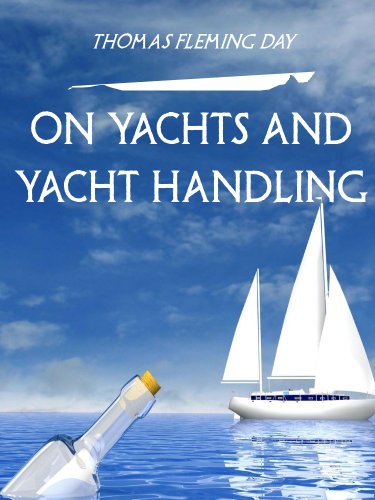-
On Yachts and Yacht Handling
Thomas Fleming Day
language (bz editores, Dec. 5, 2013)On Yachts and Yacht Handling by Thomas Fleming DayMy reason for writing this book is, that it is wanted; my excuse, thirty years' experience. In those years I have handled many boats, upon many waters.You will find this book very different from other works on the same subject. In the first place, I believe that all text-books should be written in a manner to please, as well as to instruct; that they should be agreeable reading; and, aside from their teaching value, have a certain excellence as a writing. Again, there is nothing in literature so interesting as the autobiography, real or fictional. Nearly all our great works of fiction are of this class. Robinson Crusoe's history from any other lips than those of the castaway would lose half its interest; Gil Blas in the third person would lack warmth and be wholly devoid of its peculiar zest. The flavor of the individual is lost when you speak for, and not as him. The puppet[14] talks like a puppet. It is the difference between John Alden pleading the cause of Captain Standish and John Alden pleading the cause of Master John. Let a man talk to you and he will interest and amuse; let him write for you and he will prove trite and dull. Therefore, when imparting information, I like to talk, not write. I want to infuse into my words my person, to endeavor to give my ideas an I-am-with-you tone, so that it will be me and not the book that is present, and with whom you are in communion.But this method of handling a subject is apt to breed dogmatism, especially as the reader is unable to question or deny the statements made until they have been chilled into ink. So you will find in many of my chapters that I am exceedingly dogmatic. It is unintentional, simply being a manifestation of the spirit peculiar to this style of addressing an audience—one that must hear but cannot answer. Therefore let me warn you to question all my statements, and to accept only those that harmonize with your own conclusions, after you have carefully thought them over. Those that you cannot reconcile to your own knowledge and experience, lay on one side to be tried out at a future day.
-
On Yachts and Yacht Handling
Thomas Fleming Day
language (, Nov. 24, 2013)This book is an illustrated version of the original On Yachts and Yacht Handling by Thomas Fleming Day. “I HAVE been all my life a lover of the sea; an observer of its natural and social conditions; a student of its phases and fabrics; but while my mind in its long and wide search has touched upon almost every subject connected with ocean life, the one that has constantly interested and fascinated me is that which relates to the care and government of sailing vessels. This art, which is called seamanship, is one of man's oldest and noblest attainments. What does the world owe to him who possessed it?”
-
Around the Pan With Uncle Hank
Thomas Fleming
Paperback (Forgotten Books, April 19, 2018)Excerpt from Around the Pan With Uncle HankIt was asserted that if Chicago's White City had been in existence then, it would have turned green with envy on beholding the beautifully tinted Pan.About the PublisherForgotten Books publishes hundreds of thousands of rare and classic books. Find more at www.forgottenbooks.comThis book is a reproduction of an important historical work. Forgotten Books uses state-of-the-art technology to digitally reconstruct the work, preserving the original format whilst repairing imperfections present in the aged copy. In rare cases, an imperfection in the original, such as a blemish or missing page, may be replicated in our edition. We do, however, repair the vast majority of imperfections successfully; any imperfections that remain are intentionally left to preserve the state of such historical works.
-
First in their hearts;: A biography of George Washington
Thomas J Fleming
Hardcover (W. W. Norton, March 15, 1968)None
-
Band of Brothers: West Point in the Civil War
Thomas J. Fleming
Hardcover (Walker & Co, Feb. 1, 1988)Follows the exploits of cadets and officers at West Point where graduates fought on both sides of the battle lines during the Civil War Z+
Z+
-
Benjamin Franklin
Thomas Fleming
Hardcover (MacMillan Pub Co, Nov. 15, 1972)None
-
First in Their Hearts: A Biography of George Washington
Thomas J. Fleming
Hardcover (Walker & Co, Sept. 1, 1984)A biography of the surveyor, militia major, and aide to the British General Braddock who became leader of the American forces during the Revolution and first President of the new nation.
-
Ben Franklin: Inventing America
Thomas Fleming
Library BindingNone
-
Thomas Jefferson,
Thomas J Fleming
Library Binding (Grosset & Dunlap, March 15, 1971)The life of America's third President, who was also a recognized architect, inventor, and lawyer.
-
Benjamin Franklin
thomas fleming
Hardcover (Four Winds Press, Jan. 1, 1973)None
-
Benjamin Franklin: An Intimate Portrait
Thomas J. Fleming
Paperback (Ibooks, Inc., March 1, 2005)For many people, Benjamin Franklin remains a puzzling figure in American history. This book tells Franklin's absorbing life story. In lively and informal style, Thomas Fleming presents a well-rounded account of probably the most versatile and accomplished man of his time-his boyhood in Boston...his career as a newspaperman and writer...his scientific pursuits and inventions...his years as statesman and diplomat...through his still productive old age until his death at 84. In Benjamin Franklin, Fleming not only gives a perceptive portrait of an extraordinary man, but he provides a rare glimpse into the forces that shaped the birth of a new nation.
-
Hey, Look at Me! I Like to Play
Merry Fleming Thomasson
Hardcover (Lickle Pub Inc, Aug. 1, 1988)Book by Thomasson, Merry Fleming